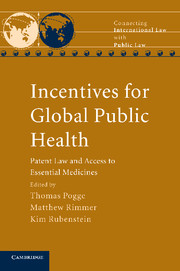Book contents
- Frontmatter
- Contents
- Contributors
- Series Editors' Preface
- Editors' Preface
- Introduction: Access to essential medicines: public health and international law
- Part I International trade
- Part II Innovation
- Part III Intellectual property
- 9 Opening the dam: patent pools, innovation and access to essential medicines
- 10 Open Source drug discovery: a revolutionary paradigm or a Utopian model?
- 11 Accessing and benefit sharing avian influenza viruses through the World Health Organization: a CBD and TRIPS compromise thanks to Indonesia's sovereignty claim?
- 12 The Lazarus Effect: the (RED) Campaign and creative capitalism
- Part IV Healthcare
- Bibliography
- Index
12 - The Lazarus Effect: the (RED) Campaign and creative capitalism
Published online by Cambridge University Press: 04 August 2010
- Frontmatter
- Contents
- Contributors
- Series Editors' Preface
- Editors' Preface
- Introduction: Access to essential medicines: public health and international law
- Part I International trade
- Part II Innovation
- Part III Intellectual property
- 9 Opening the dam: patent pools, innovation and access to essential medicines
- 10 Open Source drug discovery: a revolutionary paradigm or a Utopian model?
- 11 Accessing and benefit sharing avian influenza viruses through the World Health Organization: a CBD and TRIPS compromise thanks to Indonesia's sovereignty claim?
- 12 The Lazarus Effect: the (RED) Campaign and creative capitalism
- Part IV Healthcare
- Bibliography
- Index
Summary
Introduction
4,400 people die every day of AIDS in sub-Saharan Africa. Treatment exists. In about 60 days, a patient can go from here to here. We call this transformation the Lazarus Effect. It is the result of two pills a day taken by a HIV/AIDS patient for about 60 days. Learn more about how you can help give people the chance of life and joinred.com.
The Lazarus Effect video, the (RED) CampaignIn the recent literature, there has been much critical discussion about the role of patent law in promoting research and development in respect of neglected diseases. There has also been much exploration of alternative mechanisms – such as prizes, the Health Impact Fund, patent pools, Open Source drug discovery and priority review mechanisms – to encourage innovation in respect of essential medicines.
A number of non-government organizations, charities and philanthropists have promoted ‘grants’ as a means of stimulating investment in research and development into neglected diseases. The (RED) Campaign has been designed to boost private funding for the Global Fund to Fight AIDS, Tuberculosis and Malaria (‘The Global Fund’). The Bill & Melinda Gates Foundation (‘Gates Foundation’), and the William J. Clinton Foundation (‘Clinton Foundation’) have played an important role in funding research and development in respect of infectious diseases. It is worthwhile analysing the ways in which such charities, foundations and philanthropists have sought to deploy trade-marks, celebrity endorsements and corporate social responsibility to promote access to medicines.
- Type
- Chapter
- Information
- Incentives for Global Public HealthPatent Law and Access to Essential Medicines, pp. 313 - 340Publisher: Cambridge University PressPrint publication year: 2010
- 4
- Cited by



